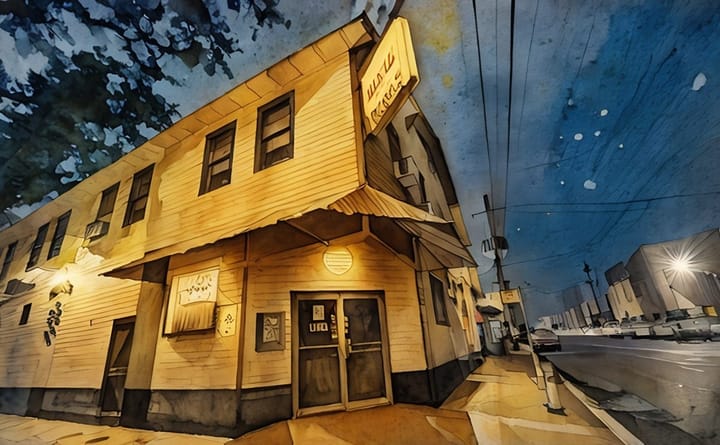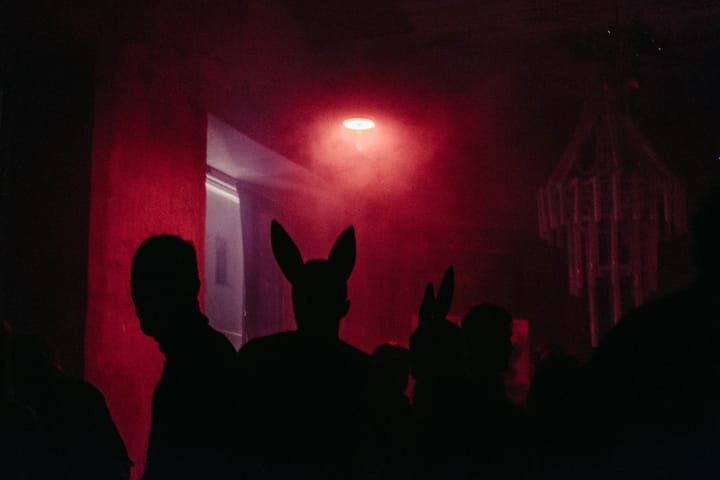Chapter 10 - Ring Around the Moon
Energy, yes—and it swept through Sara like a lightning bolt. She wanted to reach over and kiss him but instead placed her hand over his and ran a finger on his dark skin and up toward the end of his shirt.

Sara sat alone at the bar at the Green Mill Lounge in Chicago, a taxi ride from her friend's Manchester loft where she was staying for the week. Tomorrow around noon there would be a near-total eclipse of the Sun, and serious starwatchers as well as the party crowd were already positioning their cameras or just getting drunk earlier than usual. It would be an annular solar eclipse, which happens when the Moon covers the Sun's center, leaving the Sun's visible outer edges to form a ring of sunlight around the Moon. Sara might have been happy that she lucked out being near the transit path at such an astronomical event—instead she was melancholy and blamed New Orleans fatigue. April had been an intense month of encounters with several men, rich foods, strong drinks, and strange sights alongside the two weeks of conferences and client meetings. Sara was not sure if she was going crazy or just exhausted. Had she seen and experienced what she thought? Was she overworked and tired? What did all this mean?
The bartender started to put the nearly empty tequila bottle away when Sara stopped him, saying she'd finish it off. She refilled her glass and downed it straight. She looked out over the crowd—a small group from downtown business types to working class and a solid showing of artists—or at least, they looked like artists. Sara liked this bar. It seemed mysterious and stylish, and rumors persisted that beneath the bar was a network of tunnels originally created to transport coal but more likely used to run illicit booze during Prohibition or provide an escape route for the likes of Capone and his cronies. Although it attracted a lot of tourists due to the mafia history, Sara liked the music—always live and a mix of big band and jazz.
A 40-something man at the bar was trying to get the phone number of two 20-something girls. The blonde with a t-shirt that said "Mama Tried" seemed most accommodating as they moved in closer to him, pushing him back onto a bar stool. Suddenly Sara saw a flash in the girls' eyes—a bright yellow glow that seemed to hypnotize him. He sat motionless—powerless—but spoke with a soft monotone: "Can I buy you ladies a drink?" Their eyes shimmered like a wave of light had crossed over them before returning to normal. The blonde girl put her hand on his thigh and moved one of her legs between his. The dark-haired girl put a hand on his shoulder and moved forward and kissed his mouth. For a moment he seemed about to fall off the bar stool but gathered his courage to attempt to take back control by straightening himself on the stool and reaching in for another kiss, but she pulled back and smiled like a demon.
At the end of the bar, a man in his early forties with wavy dark hair sat alone, writing intently in a journal. He pushed at the bridge of his stylish glasses and touched his mouth with his pen still in hand. A pale gray shirt had three buttons undone and sleeves were neatly rolled up. There was no ring on his left hand, which held a glass with a shot of golden-brown liquid. He sipped from it without looking up. She studied him for a while—his movements and posture—his intensity—but couldn't see his face clearly as bar-light shadows dimmed his features while casting a bright spot onto his journal. It was not her practice to approach men in bars—or anywhere; they usually found their way to her, but this man seemed familiar.
Sara moved to the seat next to him.
"Writing a novel?"
"Speech notes," he said, raising his eyes but not his head. "I have to deliver one in a couple of weeks to a stuffy group of economists and politicians meeting in São Paulo. It's my hometown, so I feel a bit more pressure to perform, if you know what I mean."
Sara smiled at him and thought, how nice—a man of words. "I do know what you mean, and now that I see you in more light, I believe we've met before—January at Stanford."
He looked up and smiled. "I remember you. You were the nerdy data analyst—stunningly beautiful. You blew my whole stereotype of data geek."
"And you are the academic lawyer diplomat guy, and we met because we were both reading The End of History and the Last Man—obscure even by Palo Alto standards. Fitzgerald, right?"
"Call me Fitz, remember?" He put his pen down and looked deep into Sara's eyes. "We thought that so weirdly coincidental that you invited me to your room where we ordered room service and a bottle of wine and talked all night sitting on your bed. And I was the perfect gentleman except that I spilled a glass of red wine on the white sheets."
Sara laughed and nodded. "What a night. Have we moved on from Fukuyama? Have we all become complacently self-absorbed 'last men'? Do we feel nostalgia for the imagination and idealism—the courage that fed our desire for recognition?"
Fitz laughed. "Well, I will tell you that right now I'm feeling nostalgic." He leaned forward toward Sara. "Why did we lose touch? I am really regretting that right now."
"As I recall, you were traveling, and I was self-absorbed in personal problems—the usual outcome for busy, introverted, and non-committal types."
"So here we meet again—another weird coincidence. I'm here to take a quick break—just a three-day stopover on my way back to Brazil. Then I am off again."
"And I'm here to get away for a few days, and my friend Anna needed someone to watch her cat. Her place is in Bucktown—a loft at the Manchester."
"Cat sitting, huh? Can I take you to dinner? We have three days, and I don't want to miss this opportunity again. Don't you think the universe is trying to tell us something?"
Fitz was a diplomat from Brazil. She caught his eyes looking at her more than once across the large round table at Stanford—a group discussion about the ethics of collecting personally identifiable information by companies other than governments. The US Privacy Act had been around for decades, but that applied to information the government could collect on its citizens, but the world was deep into the digital revolution and times were changing faster than most could imagine. The Digital Economic Opportunity Index had been created by a couple of consulting firms with the purpose of analyzing the digitization opportunities of 14 developed economies. All were represented at the Stanford symposium, including Brazil, number 14 on the list.
Sara didn't have much to say at that conference. The whole thing went against her grain; Sara believed in absolute individual right to privacy, but big companies had a plan—an easy circumvention—and she knew she was fighting a losing battle and it wasn't her battle to pick. Sara was at the conference as an observer to collect data about the data collectors, the companies and governments that would lead the data revolution. Collecting information was the most important driver of future technology development and it would take place primarily in other countries with few, if any, restrictions. Brazil was a target for such development, with the United States, United Kingdom, Sweden, Germany, and France as the behind-the-scenes financiers.
She had seen Fitz's dossier, not just his symposium bio. She had done research on all the people attending. She knew quite a bit about Fitz already and saw an opportunity to talk to him when she noticed they were reading the same book. She had to be careful about revealing too much of what she knew. The irony—they were all at the conference to compare notes and discuss the collection of personal data, knowing that most people hate the idea of being investigated, categorized, and targeted. Privacy rights were fast becoming a dinosaur—just a relic of a fallen era.
Fitzgerald Stevenson received his Bachelor of Science and Master of Science degrees from the University of Brazil and went on to acquire a law degree. Sent to the US in 1975 as a diplomat, he became a distinguished graduate of the Defense Language Institute and then acquired a doctorate in economics at Stanford. Besides English, he is fluent in Modern Arabic, Egyptian Arabic–Levantine, Arabic-Iraqi, and Chinese Mandarin. He followed with an intense 10-week Portuguese language course before developing and conducting a unique immersion program focused on South American political, military, and cultural developments with experiences in Chile, Brazil, Paraguay, Uruguay, Peru, Ecuador, Colombia, Panama, and Honduras. He now works as a contractor to several research organizations with political ties to South America.
Journal entry, Backdated January 28, 1994
I saw him at the meeting today—how could I have missed him? Besides his handsome face, he had that look of a man distracted—wanting to be somewhere else—bored perhaps. That—but I also saw him frequently looking across the table at me. Turns out, I didn't imagine it. He had probably heard all that chatter before—old men with power ideas, and the irony is that they won't be around to see the completion or the future result. It was all about prestige and posturing for their next post, paycheck and, most of all, perks. They see themselves as key players—the game-changers of world economies. These are damning ideas that could bring an end to freedom—to a democratic system—and I am not the only one in protest—although mine is a silent rant from a younger generation.
He sat near the lobby fireplace reading. I was standing with my back to the fire, warming from the January chill. After the meeting, I walked the sculpture garden on the Stanford campus, one of my favorite places to spend an afternoon. I stood before the Gates of Hell and recalled Rodin's conception of the work. He envisioned people walking a flight of stairs and seeing his massive bronze gates. They would be struck—overwhelmed by the experience of Dante's hell described in his Inferno. There, the poet finds himself lost in a dark wood. He sets out to climb directly up a small mountain, but his way is blocked by three beasts. Lasciate ogne speranza, voi ch'intrate—all hope abandon, ye who enter here. Then I walked Andy Goldsworthy's Stone River, built from the rubble of Stanford buildings damaged in the 1989 earthquake, before walking to the hotel. It was the Cardinal Hotel in Palo Alto—a vintage European classic and walking distance to all the parts of the city considered most important to the aristocracy of the Valley. It was the city that made Silicon Valley, and the energy in the air was magnetic.
"Excuse me," I said, "Are you reading The End of History and the Last Man?"
And our long-term friendship would begin with a book.
Fitz takes her hand. "Have dinner with me. I think the universe is telling us something. We're here meeting again in a completely random place and time. Besides, it will be a magical night—there is a solar eclipse tomorrow—an annular that allows the Sun's energy to form a ring around the moon."
Energy, yes—and it swept through Sara like a lightning bolt. She wanted to reach over and kiss him but instead placed her hand over his and ran a finger on his dark skin and up toward the end of his shirt.
"I would love to have dinner, but I need to feed the cat first. How would you feel about takeout? There's a great Indian food place right near the loft. And yes, I am inviting you to my place again."
"I love Indian food and I would love to meet the cat. I know it may be surprising, but I'm a cat guy."
At the loft, the evening continued with a bottle of tequila Sara pulled from Anna's cabinet while the cat swirled around their legs in a figure eight, purring and leaving hair behind at every circle-round.
"Meet Kismet." Sara pointed toward the cat. "Hope you're not allergic. She's a lover."
"Wait. The cat's name is Kismet—as in chance—fate—destiny?"
Sara giggled. "And yet another oddity in the saga of Sara and Fitz." Sara handed Fitz a brandy glass with a shot of tequila. "Here's to Kismet and a ring around the moon."



